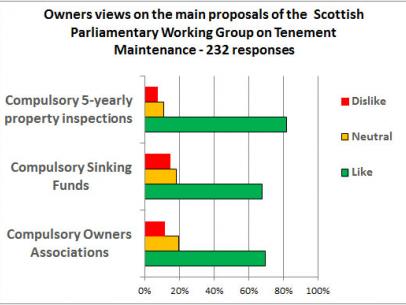Scottish Parliamentary Working Group on Tenement Maintenance
The SPWG on Tenement Maintenance came up with three main proposals - compulsory building funds, compulsory owners' associations, and compulsory five-yearly property inspections.
The Working Group
- started work in March 2018
- cross-party representation
- recommendations made to Scottish Government in 2019
- three recommendations supported by Scottish Government, currently being reviewed by Scottish Law Commission
- legislation expected in 2026
Main recommendations
Three main recommendations:
- compulsory periodic property inspections
- compulsory building reserve funds
- compulsory owners' associations
Also, proposals to clarify some 'grey areas' in the Tenements (Scotland) Act 2004.
Owners' views
We thought it important that owners' views should be heard, so we set up an online survey. The results were reported to the Working Group.
- inspections: 82% approval
- owners' associations: 70% approval
- building reserve funds: 68% approval

General responses from consultations
High degree of in principle support:
'the extent of disrepair is such that doing more of the same is not a viable option'
'in theory owners can come to voluntary agreements to maintain and invest in their tenements, the reality is that this is not happening'
'there is an urgent need to improve the energy performance of tenements in order to address climate change and fuel poverty. Tenements make up 24% of the housing stock, with 41% at Energy Performance Certificate Band D or below. We can't afford to let this sector fall behind'
Compulsory property inspections
Key features:
- minimum five year intervals
- covers common parts - roof, chimneys, walls, stairs, etc.
- carried out by independent, qualified building professionals
- results publicly available
- read into Home Report
- higher standard than Home Report but not replacing it
- allows owners to plan a programme of repairs over the coming five years
- cost of identified repairs, an added feature
- updates with completed repairs will form a building log book
Consultation responses:
Likes
- potential purchasers given a much better idea of repair costs
Concerns
- repair costs should be included
- how to enforce works identified?
- sector capacity?
Compulsory owners' association
Key features:
- a legal entity (might require UK Govt approval)
- committee of owners
- provisions to overcome owner apathy
- single annual meeting to agree budget and programme of works
- manager implements programme within approved budget
- manager does not need owners approval for every repair
- manager with powers to make owners co-operate and abide by 'house rules'
- manager's appointment reconfirmed every year
Consultation responses:
Likes
- ability to enter into contracts
Concerns
- how to enforce
- link with existing titles
- training of owners to manage?
- is this compulsory factoring?
- management quality?
Compulsory building reserve funds
Key features:
- held in central highly regulated 'social' fund with powers to invest
- individual BRF owner contributions and management in accordance with current title deeds
- underpayments made up before the flat can be sold
- owners who default have to find other ways to fund repair costs
Consultation responses:
Likes
- general support
- social fund gets round issues of establishing bank accounts for owner groups
Concerns
- affordability - low income owner-occupation of poorest tenements
- how to establish contribution rates
- balancing fund security with investment in property maintenance
- blight on property sales
Practical issues
Enforcement
- compulsion is necessary to save owners £100s in changing title deeds
- role of Home Report and impact on property values
- waypoints - grants, landlord registration, Home Reports, council tax
- ask questions at first, record data, enforce later
- compulsory factoring a fallback position if owners' associations not set up or fail
Phasing
- new builds first
- triage existing buildings
- easiest or those most likely to be assisted by proposals to be in first phases?
- the worst buildings need far more intervention - bring back Housing Action Areas?
Find out more
You can see all the reports on the Built Environment Scotland website.